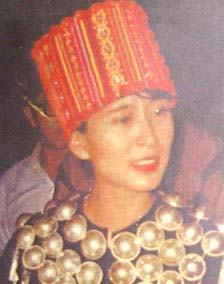In an interview with ABC public broadcaster in Australia on Thursday during a trip to the country, Burmese opposition leader Aung San Suu Kyi claimed there was no need for her to speak out about the ongoing Kachin conflict even though it has displaced more than 100,000 civilians since June 2011.
 Responding to a question from ABC presenter Leigh Sales about the criticism she has received for failing to speak up for Burma’s ethnic minorities, the Nobel Peace Prize recipient responded that “the Kachin Independence Organization, the KIO, are having official peace talks with the government and I'm a bit puzzled when I'm told, ‘Why am I not criticizing the army? Why am I not speaking up for the Kachins?’ Isn't this what the KIO is doing directly with the government? When they are engaged in direct peace talks with the government, why are we then supposed to stand up and condemn one side or the other? That might in fact derail the peace process and then we'd be blamed for it”.
Responding to a question from ABC presenter Leigh Sales about the criticism she has received for failing to speak up for Burma’s ethnic minorities, the Nobel Peace Prize recipient responded that “the Kachin Independence Organization, the KIO, are having official peace talks with the government and I'm a bit puzzled when I'm told, ‘Why am I not criticizing the army? Why am I not speaking up for the Kachins?’ Isn't this what the KIO is doing directly with the government? When they are engaged in direct peace talks with the government, why are we then supposed to stand up and condemn one side or the other? That might in fact derail the peace process and then we'd be blamed for it”.
Members of the Kachin community, many of whom arrived to Australia as refugees, boycotted an event with Aung San Suu Kyi that was organized for the Burmese community. According to a statement issued by a coalition of four Australia based Kachin community groups, they were boycotting it because the NLD leader “has not only remained silent but actively whitewashing the immensity of the issues by openly admitting her fondness for the military and campaigning for increased military training and assistance from the international community”.
Aung San Suu Kyi’s latest comments will likely reinforce the widespread perception among many Kachin of not being concerned by the military’s heavy handed treatment of Kachin civilians displaced by the conflict. Human Rights Watch and others have accused the Burma army of deliberately targeting Kachin civilians during its campaign against the KIO by carrying out war crimes that include rape and summary executions.
During the ABC interview Suu Kyi went on to explain that “rule of law” needs to be established in Rakhine state. “If we could put on end to the violence, if we could make sure that there is no further outbreak of violence, we could get those two communities to sort out their differences,” she said in reference the mostly stateless Muslim population and the Buddhist majority.



